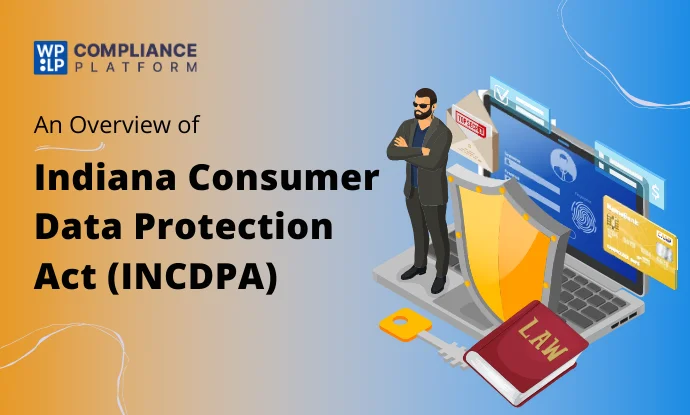An Overview of Indiana Consumer Data Protection Act (Updated)

Summary
Failure to comply with INCDPS can result in fines and penalties up to $7,500. This guide aims to provide you with a detailed overview of the law’s guidelines and how your business can comply with the law without any challenges.
Are you running a business in the Indiana region? If so, your business must comply with the Indiana Consumer Data Protection Act.
Indiana Governor Eric Columb signed the Indiana Consumer Data Protection Act, or INCDPA, on 1st May 2023.
It is an important privacy legislation that dictates guidelines to safeguard Indiana citizens’ right to privacy and obliges businesses that operate in Indiana, USA, to abide by them.
If your business operates in Indiana and you are concerned about complying with the law, do not worry—you have landed in the right place.
The law will take effect on January 1, 2026, and this guide will give you all of the information you need to make your business compliant before then.
So, let’s start and remember to read through to the end!
What is the Indiana Consumer Data Protection Act?
To begin with, let’s begin with the first question about what the law is about.
The Indiana Consumer Data Protection Act, or INCDPA, is similar to other state privacy legislation, differentiated mainly by scope and applicability.
Who Must Comply With the Indiana Consumer Data Privacy Act
Sec.1.(a) of the Indiana Consumer Data Protection Act applies to businesses operating in Indiana or producing products or services targeted to Indiana residents.
If the legal terminology sounds quite confusing to you, let’s simplify it.
Assume that you have an Indiana local eCommerce business and gather any personal data (e.g., name, mailing address, or phone number) of over 1,00,000 Indiana residents. Then, your business must comply with the law. However, the law applies to eCommerce businesses and businesses that operate similarly.
In addition, the law will also apply to you if you run a business that collects the personal details of more than 25000 Indiana users and generates a total income of more than 50% from selling collected data.
Who Are Exempted from Complying with the Indiana Consumer Data Privacy Act
While the Data Protection Act aims to protect Indiana citizens’ privacy rights, specific organizations are exempted under Sec..1 (b) of the law.
Key Requirements of the Indiana Consumer Data Protection Act
Now that we have a clear idea of INCDPA’s applicability, let’s explore some core requirements businesses must follow under this law.
Privacy Notices
To comply with ICDPA, businesses must provide a clear and readable privacy notice.
This information must be clear and should be easily understood by the users.
Limitations on Data Processing
The INCDPA also specifies strict guidelines for the processing of personal data. The law states that businesses should collect and process personal information only when it is reasonably necessary and appropriate.
In addition, it should be limited to a specific purpose and should collect sufficient, relevant information within statutory limits.
Moreover, businesses must also employ security measures to protect consumer information from theft or misuse.
Data Protection Impact Assessments (DPIAs)
Data Protection Impact Assessments (DPIAs) are a critical requirement under the INCDPA for businesses engaged in high-risk data operations.
These assessments examine possible data threats and must be performed for all new data processing activities from January 1, 2026.
However, suppose you are in business operations that require DPIAs to comply with other laws like CCPA or VCDPA and have previously conducted similar assessments; in that case, you may use them to comply with the INCDPA as well.
Controller-Processor Contracts
If a business processes data with a third-party processor, it should have a written contract outlining the purpose and scope of the processing.
The Indiana Consumer Data Protection Act (ICDPA) defines two key roles in data management: the data controller and the data processor.
A data controller is an entity that determines the purposes and means of processing personal data. They are responsible for ensuring compliance with data protection laws, including obtaining consent from consumers, providing transparency about data usage, and upholding consumers’ rights.
On the other hand, a data processor is an entity that processes personal data on behalf of the data controller. They act under the instructions of the data controller and are responsible for implementing appropriate technical and organizational measures to protect personal data.
Additionally, processors must help business fulfill their regulatory requirements, including answering consumer questions and informing companies of data breaches.
If the Indiana CDPA’s scope and applicability are clear, let’s explore the rights available to consumers under the law.
What are the Consumer Rights Under Indiana CDPA Law?
Like other state privacy laws, the Indiana CDPA law provides consumers with rights they might use.
According to Sec.1 of ICDPA, a user can use one or more rights established by requesting a data controller.
Response Process Under the INCDPA
The INCDPA requires businesses to respond to consumer requests within 45 days of exercising their rights. If the request is difficult or there are too many requests, the term can be extended by another 45 days (for a total of 90 days).
However, they must notify the consumer of the delay and explain why it is necessary.
If a business declines a user’s request, it must explain why and provide directions on how to appeal the decision. These instructions should be simple to discover and follow, and they should follow the same steps as making the initial request.
If a consumer files an appeal, the business must answer within 60 days, detailing what action was taken or why it did not act. If the appeal is denied, the consumer may submit a complaint with the Indiana Attorney General online or by other means.
INCDPA Enforcement: Fines and Penalties
When a user approaches the Indiana Attorney General, the regulatory authorities investigate the problems and give the data controller 30 days to resolve the allegations.
In addition, during these 30 days, the controller or data provider is also supposed to provide the attorney general (AG) with a written statement confirming the resolution and assuring it will not be repeated.
However, if the issue remains unresolved, the AG can investigate further, granting relief based on the investigation or imposing a fine of up to $7500 on the business.
Moreover, the imposition of such allegations also hampers businesses’ reputations, which may lead to a loss of credibility.
How Businesses Can Comply With Indiana CDPA Regulations
Now that you have a clear idea of almost everything about and around the Indiana Consumer Data Protection Act, you might wonder how to make your business compliant.
Well, the method is quite simple. You can create legal pages and cookie banners on your website that inform users about your business’s compliance with INCDPA.
Privacy Policy

A privacy policy generally gives users a clear guideline that ensures they have a clear idea of whether your website complies with the INCDPA.
You can either generate a new privacy policy or update your existing policy to align with the INCDPA guidelines.
This measure will effectively guide your users about their rights and your compliance with the law.
Consent Management
Another effective method is to obtain users’ consent when they land on your website through cookie banners or notices.
You can add to your cookie notice the details your website tracks or records when users surf on your website.
How Can You Comply with INCDPA?
As mentioned previously, an updated privacy policy or a cookie notice banner can be among the most effective measures to ensure compliance with the INCDPA.
If you have a WordPress website, the WPLP Compliance platform can be a robust solution for complying with INCDPA and other global privacy laws.
WP Legal Pages platform is IAB TCF v 2.2 certified and registered with a Google CMP partner.
What is WP Legal Pages?

WP Legal Pages helps you generate legal pages for your website that adhere to global laws, including INCDPA.
It boasts a library of over 35 essential legal pages, including a free privacy policy that users can create using their intuitive wizard.
Moreover, the plugin has a user-friendly interface, multi-language support, and plenty of customization options in the legal page templates.
To learn how to create a privacy policy with the plugin, refer to:
What is WP Cookie Consent?

WP Cookie Consent is another powerful plugin that helps users quickly create cookie notices for their website that comply with data privacy regulations. It enables them to obtain user consent for cookies before placing them on visitors’ devices.
The plugin helps your business stay compliant with legal requirements and provides business owners with insights and analytics of user behaviour.
Moreover, the plugin, similarly to WP Legal Pages, offers a guided wizard with various customization options to edit and style the cookie notice appearance.

Learn How to Add a Cookie Pop-up to Your WordPress Website.
FAQ
The Indiana Consumer Data Protection Act, or INCDPA, is a state privacy legislation that applies to businesses operating in Indiana or producing products or services targeted to Indiana residents.
The Indiana Consumer Data Protection Act applies to businesses or websites that control the personal data of at least 100,000 Indiana residents or processes the data of over 25000 Indiana residents and generate a gross income of over 50% from the data sale.
Non-compliance with the Indiana CDPA law can result in fines and penalties up to $7500.
To comply with the Indiana Consumer Data Protection Act (INCDPA), businesses operating in Indiana can generate a new privacy policy or update an existing one according to the law’s guidelines.
In addition, businesses can add about the data they track and take from users through cookie notices.
To create a privacy policy or cookie notice banner for your website, consider using the WPLP Compliance Platform, an all-in-one solution for all its legal requirements.
Conclusion
The Indiana Consumer Data Protection Act (INCDPA), signed in May 2023, is an instrumental legislative policy that will take effect in January 2026.
Built to ensure the dignity and integrity of Indiana consumers’ privacy rights, the law will prevent businesses from misusing users’ data.
If your business or website operates in Indiana and the law applies to you, tools like WP Legal Pages and WP Cookie Consent are your ideal solution to comply with the law.
If you find this article valuable, you can also consider reading:
- Do You Need a Lawyer To Create a Privacy Policy?
- ePrivacy Directive vs GDPR: Key Differences
- What is Data Processing? Types and Compliance Requirements
Don’t forget to check out the WPLP Compliance platform today!
